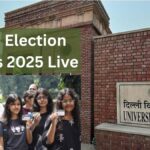NEW DELHI, September 21, 2025 – Former U.S. President Donald Trump has ignited fresh controversy with a sharp verbal assault on Indian professionals and foreign workers, accusing them of “taking away American jobs.” His comments, delivered during an AI summit in Washington, have been accompanied by a sweeping policy announcement imposing steep new fees on U.S. work visas – a move that has drawn strong criticism from India’s government, tech industry, and the public.
Trump’s Remarks at AI Summit
Speaking to an audience of top executives from Google, Microsoft, Apple, and Meta, Trump declared that American technology companies were guilty of “building factories in China, hiring workers in India, and slashing profits in Ireland.” He warned that under his administration, “those days are over,” repeating his “America First” pledge.
Trump insisted that U.S. firms must “train Americans first” rather than rely on foreign engineers and IT specialists. His speech underscored long-standing criticism that Indian professionals dominate the H-1B visa program, which allows highly skilled workers to be employed in the U.S.
The New H-1B Visa Fee
Backing his words with action, Trump signed a proclamation introducing a one-time $100,000 fee on new H-1B visas. He argued that the measure was necessary to curb “abuse” of the system and protect American jobs. Commerce Secretary Howard Lutnick doubled down, saying companies should “stop bringing in people to take our jobs.”
This dramatic escalation is expected to hit Indian professionals hardest. According to official data, nearly 70% of H-1B visas are issued to Indian nationals, mostly in IT, healthcare, and research. The fee hike could discourage companies from sponsoring Indian talent and potentially reduce skilled migration to the U.S.
Strong Response from India
The reaction in New Delhi was swift. The Ministry of External Affairs expressed concern that the new fee would have “humanitarian consequences” for Indian families and “cause disruptions in global business operations.”
The IT industry body Nasscom warned that the sudden changes would create “uncertainty for professionals, students, and businesses” and disrupt long-term contracts between Indian service providers and U.S. clients. Analysts added that such policies may prompt Indian tech firms to explore alternative markets in Europe and Southeast Asia.
Despite the sharp words, Indian officials stressed that they would continue engaging the U.S. administration to safeguard the interests of Indian professionals, who play a vital role in America’s innovation ecosystem.
Impact on U.S.–India Relations
Trump’s remarks come at a delicate time for U.S.–India relations. While both governments continue to cooperate on defense, energy, and technology partnerships, friction has emerged on trade and immigration issues.
Bilateral trade disputes over tariffs on Indian goods have already caused unease. Now, immigration restrictions risk undermining one of the strongest links between the two nations: the contribution of Indian professionals to U.S. industries.
At a recent Senate hearing, even some U.S. lawmakers acknowledged India’s importance. Senator Bill Hagerty described India as “one of the top relationships the United States has in the world,” highlighting how strategic ties must not be overshadowed by immigration disagreements.
Public Anger in India
On social media, Trump’s comments and the new visa fees triggered a wave of outrage. Young IT workers, engineers, and students expressed fear that opportunities in the U.S. – once seen as the “American Dream” – were being shut down.
One user posted: “It’s not a fee, it’s a wall. For thousands of Indian families, this shuts the door abroad.” Another lamented: “Trump is turning the American Dream into an auction.”
Several hashtags, including #SupportIndianTalent and #BoycottUSBrands, trended in India, reflecting broader frustration with what many perceive as repeated unfriendly U.S. policies.
Looking Ahead
Experts believe the situation could evolve depending on U.S. domestic politics. If Trump’s rhetoric translates into lasting immigration restrictions, Indian IT companies may accelerate investments in local hiring within the U.S. or diversify into other global markets.
For Indian professionals, however, the immediate reality is stark: a tougher path to pursuing careers in the United States, higher financial burdens for visa applications, and a political climate increasingly hostile to foreign workers.


























